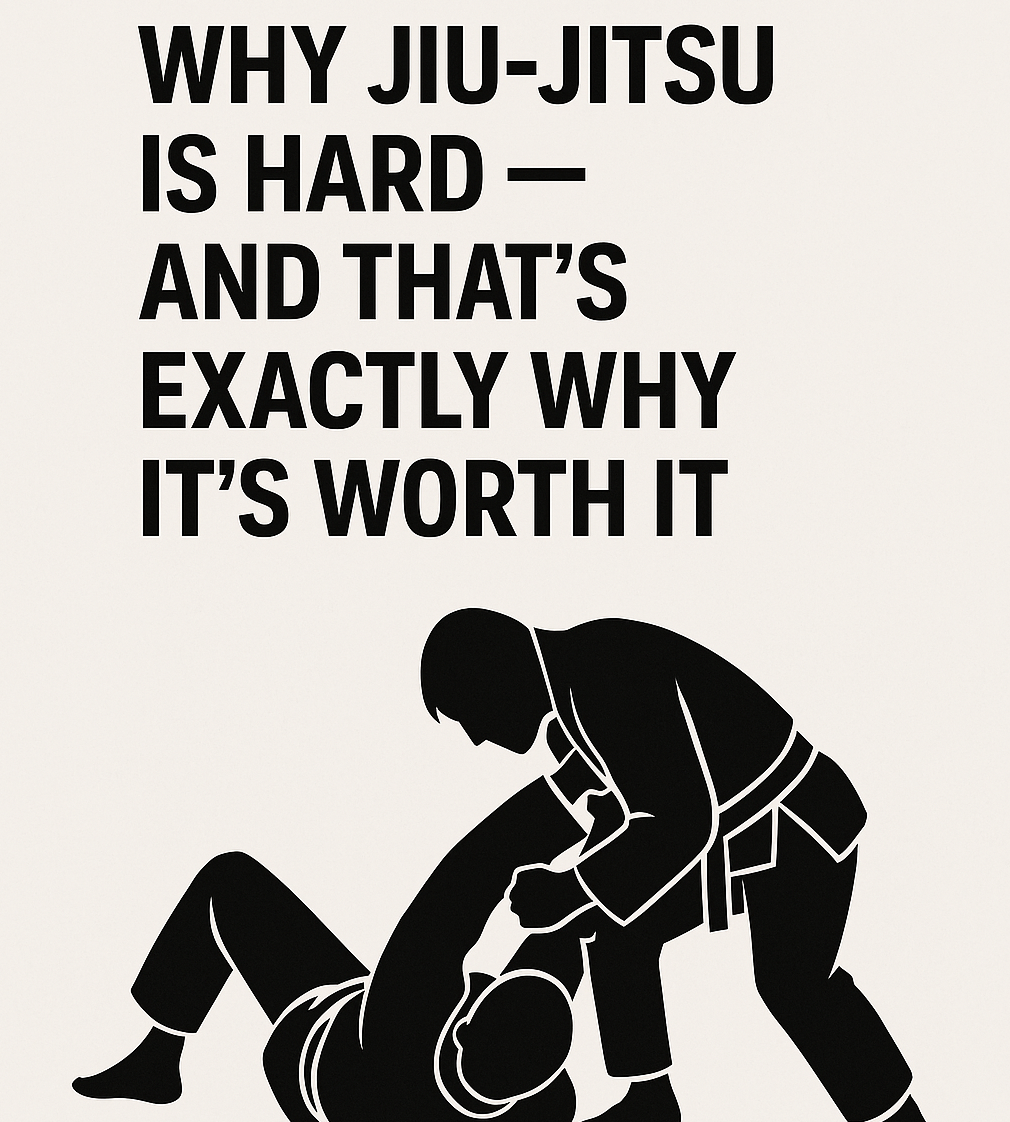
06 Apr Jiu-Jitsu Is Hard (And That’s Why It’s Worth It)
Jiu-Jitsu Will Challenge You Like Nothing Else
I’ve trained my entire life. Since I was 12 or 13, I’ve been involved in different strength training disciplines—calisthenics, CrossFit, bodybuilding, powerlifting. I’ve also tried multiple martial arts, but nothing has challenged me like Brazilian Jiu-Jitsu (BJJ).
I’ve spent the last 12–13 years on the mats, and if I’m fortunate, I’ll spend many more. Jiu-Jitsu is a lot of things—technical, rewarding, frustrating, humbling, addictive. But if I had to describe it in one word, I’d say:
👉 It’s hard.
When I received my black belt, I felt joy, a sense of accomplishment, and pride. But my coach’s words that day stuck with me:
🗣 “You’re not done. The journey just begins. Jiu-Jitsu is a fresh product, like a flower—if you don’t water it, it will fade away.”
And he was right.
Jiu-Jitsu isn’t something you master and move on from. It’s something you constantly refine, relearn, and struggle through.
Brazilian Jiu Jitsu’s links to mental health explored in new research study
Jiu-Jitsu: The Human Chess Game
They call BJJ “human chess” for a reason. Every roll is a game of strategy.
You make a move, your opponent counters. You try to anticipate their next step while setting up your own attack. You get caught, analyze your mistakes, and troubleshoot for the next round.
Unlike many martial arts, BJJ is endless.
🔹 Judo focuses primarily on takedowns, with a small amount of ground control (newaza).
🔹 Wrestling is almost entirely takedowns and pins.
🔹 Boxing has a handful of core strikes—jab, cross, hook, uppercut—but the magic is in execution.
Brazilian Jiu-Jitsu? You need to know everything:
✅ Takedowns
✅ Takedown defense
✅ Positioning
✅ Escapes
✅ Submissions
✅ Submission defense
And just when you think you’ve got it all figured out, someone invents a new move.
Jiu-Jitsu evolves constantly. If you aren’t learning, you’re falling behind.
You Never Stop Learning
At black belt, I thought I’d finally have the complete picture.
❌ Wrong.
Only now do I have a broad enough understanding to start putting everything together at a higher level. It’s like reaching the top of a mountain—only to realize there’s another one in front of you.
You never stop growing.
You replay mistakes in the shower. You think about a submission you should’ve escaped. You obsess about that kimura you walked into last night.
And that’s exactly why it’s so addictive.
The Mental Game: Why Jiu-Jitsu Breaks People
BJJ is physically demanding, but what makes it truly hard is the mental battle.
The Comparison Trap
You might think:
❌ “I suck, I’m getting tapped every round.”
❌ “Why do I feel like I’m getting worse?”
❌ “How is this white belt catching me?”
We all do it.
There’s constructive comparison (motivates growth), and destructive comparison (makes you want to quit).
The solution?
👉 Shut up and train. No one cares. Keep showing up.
Hard Truths That Apply to Life Too
1. Training More = Getting Better
People want elite results on hobby-level effort. Doesn’t work like that.
You wouldn’t train 2x/week in basketball and expect to play like Jordan.
Same with Jiu-Jitsu. If you’re training 2–3x/week for fun—great. Enjoy it. But don’t compare yourself to 20-year-olds training 10 hours a week for Worlds.
Be honest about your inputs and goals.
Learning curve in complex skills / motor learning
2. You’re Only as Good as Your Last Roll
Roll great with a brown belt. Get smashed by a white belt next round.
It’s normal.
✅ Higher belts? You’ve got nothing to lose.
✅ Lower belts? You’ve got everything to lose.
Stop chasing perfection. Focus on consistency.
3. You’re Probably Just a Few Inches Off
You don’t suck.
You’re just missing a detail or two.
Like a golfer whose ball lands in the pond—the problem wasn’t where the ball landed, but how slightly off their swing was.
Fix one thing at a time. That’s how mastery works.
Conclusion: Keep Showing Up
BJJ is 95% mental and 5% physical.
Most people quit before they get good.
If you want to win at Jiu-Jitsu (and life), follow this:
🔥 Keep training. Enjoy the struggle. Don’t take it too seriously.
And remember:
🗣 “Jiu-Jitsu isn’t about talent. It’s about who’s left.” — Chris Haueter
Leave a comment—what’s the hardest thing you’ve had to learn in Jiu-Jitsu?
Recommended Reading:
Why you’re not seeing progress

No Comments